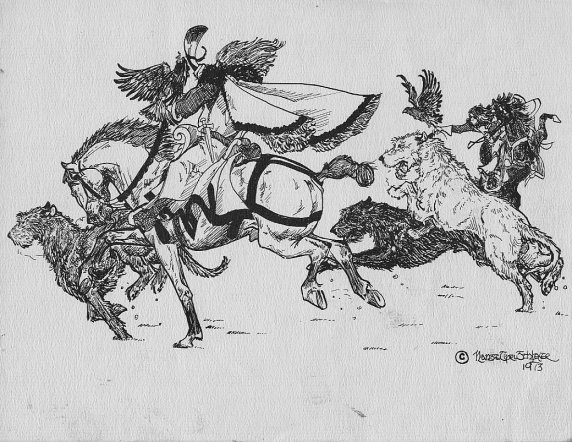
In 1897, the first Irish Wolfhound registered by the AKC was “Ailbé,” an ancient name, and perhaps a grim reminder of a famous Wolfhound of mythic proportions.
As the legend goes, Ailbé lived two thousand years ago, a dog owned by Mesroda, the King of Leinster. Ailbé was famous for his ferocity, fidelity, and prowess as a protecting guard dog. Indeed, it was said that he defended the whole kingdom of Leinster against the King’s enemies more fiercely than any army could.
Two other rulers, the King of Connaught and the King of Ulster, wanted Ailbé for themselves, and made offers to buy the hound. The King of Connaught offered, “three score hundred milch cows at once and a chariot with two horses and as much again at the end of the year,” and a similar offer was made by the King of Ulster who threw in land, slaves and cattle for good measure.
Mesroda refused to sell because by gratifying one party, he made an enemy of the other. Some versions of the legend, however, say that Ulter’s offer was accepted. Either way, a war broke out between the two kings, Ailill and Medb, and this would be the undoing of the gallant Ailbé for he had deserted the King of Leinster and aligned himself with Ulster. In the course of battle, Ailbé attacked the chariot of the King of Connaught by seizing the axle and hanging on even as the kings hacked at each other – and perhaps the dog, as well, with swords.
Ailbé quite literally lost his head, but even in death, he refused to let go. The chariot rumbled off with Ailbé’s jaws still firmly clamped on the axle, the head still dripping blood as the chariot thundered off across the field of battle from Ballaghmoon in Kildare to Farbill in Westmeath. In Farbill the head dropped from the pole in a ford, known afterwards as Ath Cind Chon, or Hound’s Head Ford.
Ailbé lived on in the prose tale of MacDatho probably based on an earlier poem:
“Ailbé, his famous cunning splendid hound,
From whom is the renowned plain of Ailbé;”
We may never know if Ailbé existed, but there were actual Kings of Connaught from the fifth to fifteenth centuries who ruled over the cóiced of Connacht west of the River Shannon in Ireland. Records show that in 1224, one King of Connacht, Hugh O’Conor, appointed a steward to take care of his loyal Wolfhounds.
Image: Drawing by Nanci Cipri Schlexer
